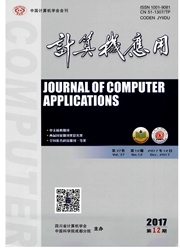

 中文摘要:
中文摘要:
公交车载网络作为城市车载网络中的重要组成部分,由于具有周期性移动规律,能为城市车载网络的大范围通信提供支撑,而复杂的城市道路环境给公交车载网络的高效可靠路由协议带来了极大的挑战。针对具有周期运动特征的公交车载网络,设计单跳与实时改进的多跳路由协议SRMHR,保证单跳转发的链路生存时间以及多跳转发有限延时内的提交概率;根据城市信号传播衰减特征和车辆移动模型设计单跳链路筛选机制,并结合改进的多跳延时相关概率转发模型,保证公交转发的高效、可靠。在城市交通模拟仿真平台上,结合微调的真实道路交通数据,分别测试了方案中信号衰减模型、不同车流密度下候选筛选以及红灯延时修正的性能参数,验证了方案中各环节的有效性;最后与SF和SW协议的性能进行了对比,结果表明SRMHR协议具有较高的数据传输成功率和较低的递交延时。
 英文摘要:
英文摘要:
As an important part of the urban vehicle network, bus vehicle network provides supports for a wide range of urban-vehicle communication network due to cyclical movement law. However, the complex urban road environment brings great challenges to highly efficient and reliable routing protocols for bus vehicle network. In bus vehicle network with the characteristics of cyclical movement, a new protocol named SRMHR ( Single & Realmending-Multi Hop Routing) was proposed to ensure the single hop link's life time and multi-hop submission probability in limited delay. According to the signal propagation attenuation model and vehicle mobility model, a single hop selection mechanism and a multi-hop delay probability forwarding mechanism were proposed to ensure the reliability and effectiveness of bus-assistant forwarding. On the urban traffic simulation platform, using real road traffic data of slight adjustment, the performance of signal attenuation model, single hop selection mechanism and light correction model under different traffic densities were tested. The results prove the validity of each link of the scheme. Comparison with SF ( Spray and Focus) and SW ( Spray and Wait) proves that SRMHR protocol has a higher successful rate of data transmission and lower delivery delay.
 同期刊论文项目
同期刊论文项目
 同项目期刊论文
同项目期刊论文
 期刊信息
期刊信息
